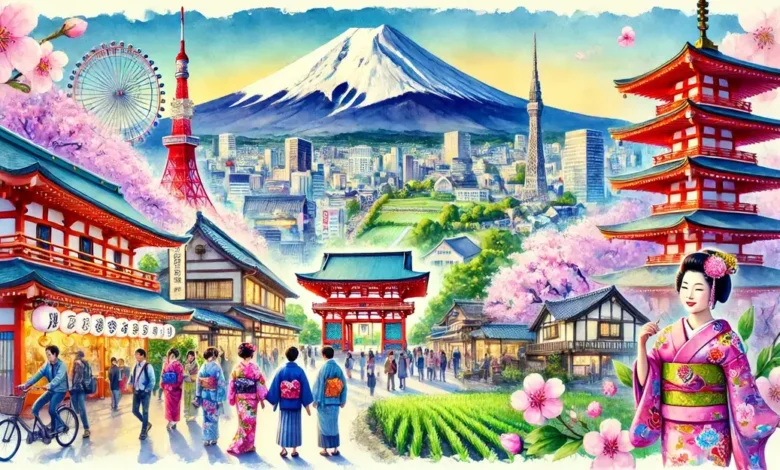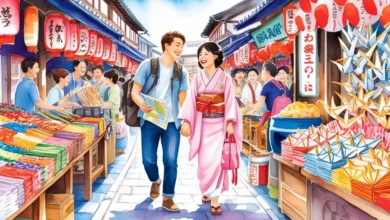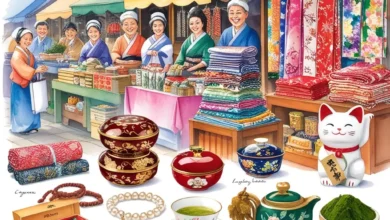Things Every Traveller Should Know Before Visiting Japan

Japan is a fascinating location to visit, encompassing both timeless traditions and modern marvels. If you’re considering a visit to this mountainous nation, here are some things every traveller should know before visiting Japan.
Carry cash with you
In Japan, people often use cash to pay for things. It’s normal to carry a lot of yen (Japanese money) in your wallet. Japan is very safe, so you don’t have to worry about losing your money. Most shops and hotels accept credit cards, but you’ll still need cash. Many restaurants and small businesses only take cash. If you run out of cash, don’t worry! You can go to a 7-Eleven store and use their cash machine any time, day or night. There are also special travel cards like Suica and ICOCA. These cards let you tap to pay for your travel. But remember, you need to put money on these cards before you can use them.

Take the train
If you’re visiting Japan for the first time, you might find the train system a bit scary. In Tokyo alone, there are 158 train lines covering 2,930 miles! But don’t worry, trains are the best way to get around in Japan. They run often, are rarely late, and you can get special passes that save you money. One of the coolest trains is the Shinkansen, also known as the bullet train. It’s so fast that it can get you from Osaka to Kyoto in just 15 minutes!
But remember, the trains don’t run all the time. They aren’t available 24 hours a day, seven days a week. So, when you’re in Japan, don’t forget to check the train times and always have a plan.

Count blocks, not streets
Before we had GPS, finding an address in Japan was like looking for a hidden treasure. In Japan, they don’t use street names like we do. Instead, they give numbers to blocks of houses, and the roads in between don’t have names. To make things even more tricky, the house numbers on each block don’t go in order.
So, mail carriers often remember their routes by the names of the families who live there, not by the house numbers. But don’t worry, there’s a helpful hint: in Tokyo, most street lights show the name of the area, the district number (called “chōme”), and the block number (called “ban”).

Go out to eat
In Japan, there’s a word, kuidaore, which means spending so much money on food that you go broke. Food is a big deal in Japan. In fact, Japan has more top-rated restaurants than any other country in the world. You’ll often see long lines of people waiting to eat at popular places, especially if the food is good and not too expensive.
So, if you see a line, it might be worth joining! But remember, some restaurants in Japan might not let foreigners in. This could be because the owners want to avoid any problems with tourists who don’t know the local customs. Some places might only let you in if you’re with someone they trust.

Follow proper dining etiquette
When you’re eating with chopsticks in Japan, there are some important rules to remember. First, never use your chopsticks to point, poke, or stick straight up in sticky rice. This is because it looks like a custom used at funerals. When you’re done eating, place your chopsticks across your bowl. If there’s no bowl, put them to the right of your plate. But be careful not to let the tips touch the table. When you’re drinking with others, it’s polite to fill each other’s glasses.
So, wait for someone else to fill your glass, and then do the same for them. If you don’t want any more to drink, just leave your glass full. These rules might seem different, but they’re a part of Japanese culture.

Please do not tip
In Japan, you don’t need to leave a tip when you pay for something. If you do, someone might chase after you to give it back, thinking you left your money by mistake. In Japan, people work hard and take pride in what they do. They always try to give good service, so tipping isn’t expected. In fact, it might even be seen as rude. Don’t worry, the people who work in service jobs earn enough money to live on. But there’s one exception.
If you stay at a traditional Japanese inn, called a ryokan, and you have a nakai-san (a kind of personal helper), then you do give a tip. You do this when you check in, and you put the money in a special envelope. The usual amount is 1,000 yen for each person.

Take off your shoes
In Japan, it’s very important to take off your shoes before you go into someone’s house. This rule also applies to some restaurants and most changing rooms. You can tell where to take off your shoes because the floor level will change at the entrance. Some restaurants even give you special slippers to wear in the bathroom. But remember, you should leave these slippers in the bathroom when you’re done. Don’t accidentally walk back to your table with them on!

It is impolite to eat while walking
Although it may be common to walk along the street while eating a snack or sipping a cup of coffee, doing so in Japan is considered impolite. Most consumers will take the delicacy quickly after ordering it from a vending machine or convenience store to avoid strolling with it. The same is true with smoking; you should only do so in approved areas.
Wash before getting in an ‘onsen‘
An onsen is a special kind of spa in Japan. It’s a hot spring that comes from the ground because of the many volcanoes in the country. If you ever go to an onsen, there are some rules you need to follow. First, you can’t wear a swimsuit. Everyone goes in without any clothes on. Before you get in the water, you need to take a shower and clean yourself. If you have long hair, make sure to tie it up. And remember, don’t put your head under the water. All these rules are there to keep the water clean and healthy for everyone to enjoy.

Don’t flaunt your tattoos
In Japan, tattoos are sometimes linked to a group called the Yakuza. Because of this, it’s not considered polite to show your tattoos in public places, especially in onsens, which are hot spring spas. But don’t worry, if your tattoos are small and not too noticeable, some pools and spas might give you special waterproof stickers. You can put these stickers over your tattoos while you’re there.
Things are starting to change, and people are becoming more accepting, especially towards visitors from other countries. But still, you might get a few curious looks if you have tattoos.

Keep your garbage
You might be surprised to find out that in Japan, a very clean country, there aren’t many trash cans on the streets. You can find some near places like convenience stores, vending machines, and train stations. But most of the time, you’ll need to hold onto your trash until you get back home or to your hotel. If you do find a trash can, make sure to put your trash in the right part. There are usually three sections: one for things that can burn, one for things that can’t burn, and one for things that can be recycled.

Learn some fundamental Japanese
It’s always worth making an effort with the local language, even if English is spoken by some in Japan. Here are some useful words and phrases worth knowing:
こんにちは [kon’nichiwa] – Hello
おはようございます [ohayou gozaimasu] – Good morning
おはよう [ohayou] – Good morning (informal)
こんばんは [konban wa] – Good evening
ありがとうございます [arigatō gozaimasu] – Thank you
ありがとうございました [arigatō gozaimashita] – Thank you very much
すみません [sumimasen] – Excuse me*
*Doubly useful as it can be used to get a person’s attention, and also to apologise.
はい [hai] – Yes
いいえ [iie] – No*
*You’ll find this is rarely used.
わかりません [wakarimasen] – I don’t understand
もしもし [moshi moshi] – Hello?*
*Mainly used when answering the phone.
おげんきですか [ogenki desu ka] – How are you?
さようなら [sayounara] – Goodbye
またね [matane] – See you
いただきます [itadakimasu] – I humbly receive
You can learn Japanese for free by following @gojapan_listone, this is a product of Kuro Chan, specializing in sharing Japanese knowledge.
If you say itadakimasu before you begin eating, you’ll impress people with your manners. This phrase expresses humility and gratitude for the meal you are about to enjoy.




